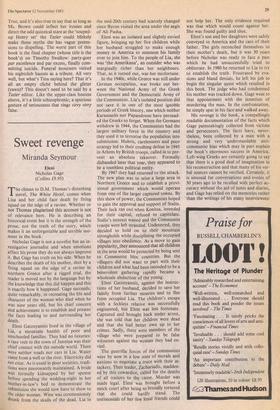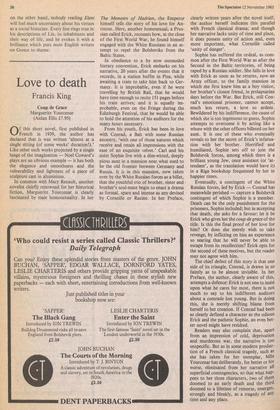Sweet revenge
Miranda Seymour
Eleni Nicholas Gage (Collins £9.95)
The climax to D.M. Thomas's disturbing novel, The White Hotel, comes when Lisa and her child face death by firing squad on the edge of a ravine. Whether or not Thomas plagiarised this account is not of relevance here. He is describing an historical event but it is the strength of the prose, not the truth of the story, which makes it an unforgettable and terrible mo- ment in the book.
Nicholas Gage is not a novelist but an in- vestigative journalist and when emotions affect his prose they do not always improve it. But Gage has truth on his side. When he describes the death of his mother, shot by a firing squad on the edge of a ravine in northern Greece after a rigged trial, the reader is moved not by the language but by the knowledge that this did happen and this is exactly how it happened. Gage succeeds, quite remarkably, in recreating the life and Character of the woman who died when he was nine years old, but his chief concern and achievement is to establish and present the facts leading to and surrounding her death.
Eleni Gatzoyannis lived in the village of Lia, a mountain hamlet of poor and unschooled families. They had no luxuries: a rare visit to the town of Jannina was their chief contact with the outside world. There were neither roads nor cars in Lia. Water Came from a well or the river. Electricity did not exist. As is usual in poor societies, tradi- tions were passionately maintained. A bride was formally kidnapped by her spouse before spending the wedding-night in her mother-in-law's bed to demonstrate the submission she would now have to show to the older woman. Wine was ceremoniously drunk from the skulls of the dead. Lia in the mid-20th century had scarcely changed since Byron visited the area under the aegis of Ali Pasha.
Eleni was an isolated and slightly envied figure, bringing up her five children while her husband struggled to make enough money in America to summon his family over to join him. To the people of Lia, she was 'the Amerikana', an outsider who was
marginally richer than her neighbours. That, as it turned out, was her misfortune. In the 1940s, while Greece was still under German occupation, war broke out bet-
ween the National Army of the Greek Government and the Democratic Army of the Communists. Lia's isolated position did not save it in one of the most ignoble periods of Greek history, one which neither Karamanlis nor Papandreou have persuad- ed the Greeks to forget. When the Germans withdrew in 1944, the Communists had the largest military force in the country and they used it to terrorise the population into submission. Hubris, carelessness and poor strategy led to their crushing defeat in 1945 in Athens by British troops, called in to pre- vent an absolute takeover. Formally disbanded later that year, they appeared to be a toothless political entity.
By 1947 they had returned to the attack. The new plan was to seize a large area in Northern Greece and to establish a provi- sional government which would operate from one of the larger captured towns. By this show of power, the Communists hoped to gain the approval and support of Stalin. Their luck ran out when Konitsa, intended for their capital, refused to capitulate.
Stalin's interest waned and the Communist troops were left stranded. Undeterred, they decided to hold on to their mountain strongholds while disciplining the occupied villages into obedience. As a move to gain popularity, they announced that all children in the area would be protected by being sent to Communist bloc countries. But the villagers did not want to part with their children and what had been intended to be a benevolent gathering rapidly became a wholesale abduction of the young.
Eleni Gatzoyannis, against the instruc- tions of her husband, decided to save her family from further miseries and to flee from occupied Lia. The children's escape with a feckless relative was successfully engineered, but Eleni was less fortunate. Captured and brought back under arrest, she was told that her children were dead and that she had better own up to her crimes. Sadly, there were members of the village who were prepared to be false witnesses against the woman they had en- vied.
The guerrilla forces of the communists were by now in a low state of morale and anxious to negotiate a truce with their at- tackers. Their leader, Zachariadis, madden- ed by this cowardice, called for the deaths of all traitors to the cause. Murder was made legal. Eleni was brought before a mock court after being so brutally tortured that she could hardly stand. The testimonials of her few loyal friends could not help her. The only evidence required was that which would count against her. She was found guilty and shot.
Eleni's son and her daughters were safely conveyed to America and the care of their father. The girls reconciled themselves to their mother's death, but it was 30 years before Nicholas was ready to face a past which he had unsuccessfully tried to obliterate. In 1980 he returned to Lia to try to establish the truth. Frustrated by eva- sions and bland denials, he left his job to begin the singular quest which resulted in this book. The judge who had condemned his mother was tracked down. Gage went to that appointment with the intention of murdering the man. In the confrontation, he simply spat in his face and walked away.
His revenge is the book, a compellingly readable documentation of the facts which Gage painstakingly collected from victims and persecutors. The facts have, never- theless, been collected by a man with a strong and very understandable anti- communist bias which may in part explain the book's enormous success in America. Left-wing Greeks are certainly going to say that there is a good deal of imagination in his reconstruction and that many of his ver- bal sources cannot be verified. Certainly, it is unusual for conversations and events of 30 years ago to be recalled with perfect ac- curacy without the aid of notes and diaries, and Gage has relied on the memories rather than the writings of his many interviewees:
on the other hand, nobody reading Eleni will feel much uncertainty about his virtues as a social historian. Every line rings true in his descriptions of Lia, its inhabitants and their way of life, and he evokes it with a brilliance which puts most English writers on Greece to shame.















































 Previous page
Previous page